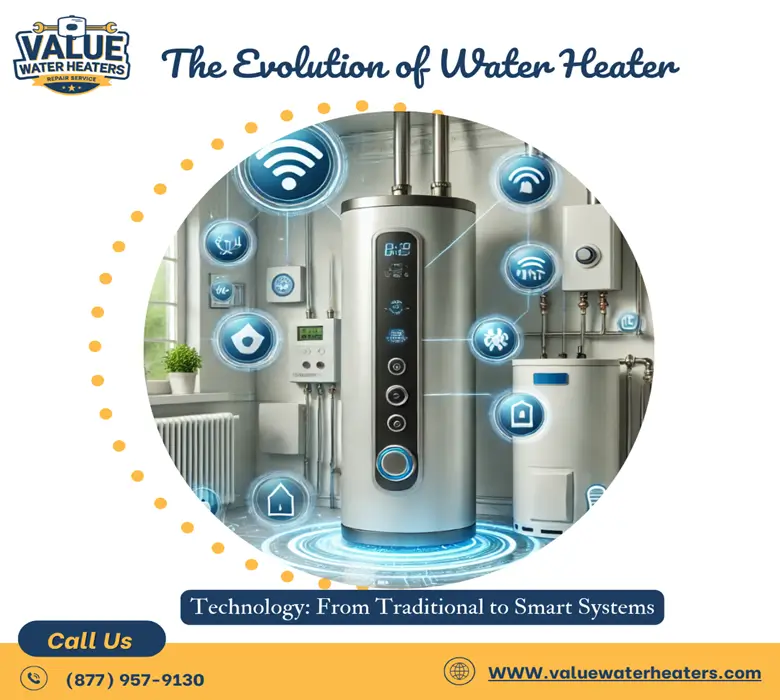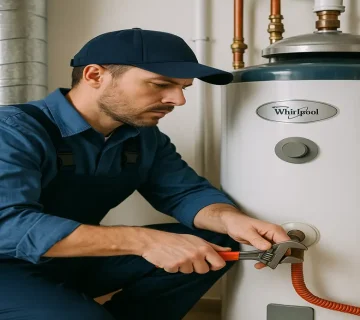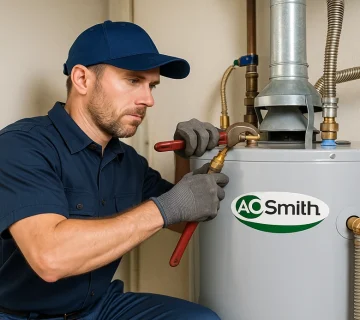The evolution of water heater technology has revolutionized the way homes access hot water. From traditional tank systems to smart water heaters, advancements have significantly improved energy efficiency, sustainability, and convenience.
This article explores the five most powerful changes in the evolution of water heater technology, showing how innovation has reshaped the industry and what it means for homeowners today.
1. Traditional Tank Water Heaters: The Beginning of the Evolution of Water Heater Technology
The evolution of water heater technology started with conventional storage tank water heaters. These models:
- Store 30 to 80 gallons of hot water in an insulated tank
- Continuously heat water, even when not in use
- Use gas or electric heating elements to maintain temperature
Limitations of Traditional Water Heaters:
- High energy consumption due to standby heat loss
- Limited hot water supply, requiring time for reheating
- Large, space-consuming design
Although these units provided a reliable hot water source, their inefficiency led to the development of more advanced systems.
2. Tankless Water Heaters: A Major Step in the Evolution of Water Heater Technology
A major advancement in the evolution of water heater technology is the introduction of tankless water heaters, also known as on-demand water heaters. These systems:
- Heat water only when needed, eliminating standby energy loss
- Use high-powered burners or electric elements for instant heating
- Deliver continuous hot water without requiring storage
Advantages of Tankless Water Heaters:
- 30% more energy-efficient than traditional models
- Compact design, making them ideal for small spaces
- Longer lifespan (20+ years) compared to storage tanks
Tankless technology marks a significant step forward in energy efficiency and has become a popular upgrade for modern homes.
3. Hybrid Water Heaters: A Breakthrough in the Evolution of Water Heater Technology
Heat pump water heaters, also known as hybrid water heaters, represent a milestone in the evolution of water heater technology by using ambient air to heat water. These units:
- Extract heat from surrounding air and transfer it to the water
- Use electric heating elements only when additional heating is required
- Reduce energy consumption by up to 60%
Why Hybrid Water Heaters Stand Out:
- Lower operating costs, saving homeowners money
- Eco-friendly technology, reducing carbon emissions
- Best suited for warm climates, where ambient heat is available
Despite requiring more space and a higher initial investment, hybrid water heaters offer long-term energy savings.
4. Smart Water Heaters: The Most Advanced Stage in the Evolution of Water Heater Technology
The evolution of water heater technology has reached a new level with smart water heaters, integrating Wi-Fi and automation for better control and efficiency. These high-tech systems allow homeowners to:
- Adjust temperature settings remotely via mobile apps
- Monitor real-time energy consumption
- Receive alerts for leaks, maintenance, and system failures
Benefits of Smart Water Heaters:
- Higher efficiency, with AI learning household usage patterns
- Remote troubleshooting, reducing service calls
- Integration with smart home devices, such as Alexa or Google Home
Smart water heaters offer unmatched convenience, making them a top choice for energy-conscious homeowners.
5. Solar Water Heaters: The Future of the Evolution of Water Heater Technology
As sustainability becomes a priority, solar water heaters have emerged as a game-changer in the evolution of water heater technology. These systems:
- Use solar panels to harness sunlight for water heating
- Store excess energy for use on cloudy days
- Drastically reduce dependence on gas and electricity
Why Solar Water Heaters Are the Future:
- Zero emissions, making them the most eco-friendly choice
- Significant energy savings, lowering utility bills
- Potential rebates, with incentives available in some regions
While installation costs are higher, solar water heating systems provide long-term financial and environmental benefits.
The Next Phase in the Evolution of Water Heater Technology
The evolution of water heater technology continues, with future advancements focusing on:
- More efficient heat pump technology, reducing electricity use
- AI-driven systems, optimizing energy consumption based on user behavior
- Expanding renewable energy integration, with improved solar and geothermal options
As technology advances, water heaters will become even more efficient, automated, and environmentally friendly.
Final Thoughts on the Evolution of Water Heater Technology
The evolution of water heater technology has led to groundbreaking advancements, allowing homeowners to save energy, reduce costs, and enjoy smarter control over hot water usage. From traditional tank heaters to cutting-edge smart systems, each phase of innovation has improved efficiency, performance, and sustainability.
For expert water heater installation and upgrades, visit our website. You can also find us on Google Maps, Bing Maps, Yahoo Local, or check customer reviews on Yelp.
The evolution of water heater technology has transformed how homes access hot water, improving efficiency, convenience, and energy savings. Traditional storage tank water heaters once dominated the market, but today’s homeowners have access to tankless, hybrid, and smart water heating systems that offer greater control and performance.
This article explores five major advancements in water heater technology, highlighting how innovations have improved efficiency, sustainability, and smart home integration.
1. Traditional Tank Water Heaters: The Foundation of Water Heating
For decades, conventional storage tank water heaters have been the standard. These units operate by:
- Storing 30 to 80 gallons of heated water in an insulated tank
- Continuously maintaining the temperature, even when not in use
- Using gas or electric heating elements to reheat water as needed
Limitations of Traditional Water Heaters:
- Higher energy consumption due to standby heat loss
- Limited hot water supply, requiring recovery time
- Bulky size, taking up significant space in homes
While these units remain affordable and reliable, their inefficiency led to the development of more advanced heating technologies.
2. Tankless Water Heaters: A Shift Toward Energy Efficiency
One of the most significant advancements in the evolution of water heater technology is the introduction of tankless water heaters. Also known as on-demand water heaters, these systems:
- Heat water only when needed, reducing standby energy loss
- Use high-powered burners or electric elements for instant heating
- Provide endless hot water without storage limitations
Benefits of Tankless Water Heaters:
- Up to 30% more energy-efficient than traditional models
- Compact design, saving space in smaller homes
- Longer lifespan (20+ years) compared to storage tanks
Tankless models have become increasingly popular for energy-conscious homeowners looking to reduce utility bills and enhance efficiency.
3. Heat Pump Water Heaters: Hybrid Efficiency
Heat pump water heaters, also known as hybrid water heaters, represent a breakthrough in energy efficiency by utilizing ambient air to heat water. These systems:
- Extract heat from the surrounding air and transfer it to the water
- Use electricity only when additional heating is needed
- Consume 60% less energy than traditional electric water heaters
Advantages of Hybrid Water Heaters:
- Lower operating costs, reducing electricity use
- Eco-friendly, cutting down on carbon emissions
- Effective in warm climates, where ambient heat is readily available
Although hybrid systems require more space and a higher upfront cost, their energy savings make them an excellent long-term investment.
4. Smart Water Heaters: Automation and Remote Control
The latest development in the evolution of water heater technology is smart water heaters, which integrate with Wi-Fi and home automation systems to enhance control, efficiency, and monitoring. These systems allow users to:
- Adjust temperature settings remotely via smartphone apps
- Track energy usage to optimize performance
- Receive leak detection alerts and automatic maintenance reminders
Why Smart Water Heaters Are a Game-Changer:
- Increased efficiency, with learning algorithms adapting to usage patterns
- Remote troubleshooting, reducing service calls
- Integration with smart home systems, such as Amazon Alexa or Google Home
Smart water heaters offer the ultimate convenience, making it easier than ever to manage hot water use while reducing energy waste.
5. Solar Water Heaters: The Future of Sustainable Water Heating
As homeowners seek eco-friendly solutions, solar water heaters have gained popularity. These systems use solar panels to collect energy and heat water, significantly reducing reliance on electricity or gas.
Key Benefits of Solar Water Heaters:
- Environmentally friendly, producing zero emissions
- Reduced energy costs, utilizing free solar power
- Long-term savings, with government rebates available in some areas
While the initial installation cost can be high, solar water heating systems offer significant savings over time, making them a viable solution for sustainable energy use.
The Future of Water Heater Technology
The evolution of water heater technology continues, with future advancements focusing on:
- More efficient heat pump systems, using minimal electricity
- AI-driven smart water heaters, optimizing energy use based on household behavior
- Wider adoption of solar-powered heating, reducing reliance on fossil fuels
As innovations progress, homeowners will have even greater control over water heating efficiency, allowing for lower energy consumption and improved sustainability.
Final Thoughts on the Evolution of Water Heater Technology
The evolution of water heater technology has led to significant advancements, providing homeowners with more efficient, cost-effective, and environmentally friendly options. From traditional storage tanks to cutting-edge smart water heaters, new technology has enhanced energy savings, durability, and user convenience.
For expert water heater installation and technology upgrades, visit our website. You can also find us on Google Maps, Bing Maps, Yahoo Local, or check customer reviews on Yelp.





